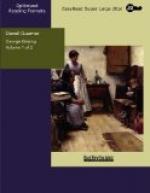The Polterham Literary Institute was a “hot-bed of Radicalism.” For the last year or two this had been generally understood. Originating in the editorial columns of the Polterham Mercury, the remark was now a commonplace on the lips of good Conservatives, and the liberals themselves were not unwilling to smile an admission of its truth. At the founding of the Institute no such thing was foreseen; but in 1859 Polterham was hardly conscious of the stirrings of that new life which, in the course of twenty years, was to transform the town. In those days a traveller descending the slope of the Banwell Hills sought out the slim spire of Polterham parish church amid a tract of woodland, mead and tillage; now the site of the thriving little borough was but too distinctly marked by trails of smoke from several gaunt chimneys—that of Messrs. Dimes & Nevison’s blanket-factory, that of Quarrier & Son’s sugar-refinery, and, higher still (said, indeed, to be one of the tallest chimneys in England), that of Thomas & Liversedge’s soap-works. With the character of Polterham itself, the Literary Institute had suffered a noteworthy change. Ostensibly it remained non-political: a library, reading-room and lecture-hall, for the benefit of all the townsfolk; but by a subtle process the executive authority had passed into the hands of new men with new ideas. A mere enumeration of the committee sufficed to frighten away all who held by Church, State, and Mr. Welwyn-Baker: the Institute was no longer an Institute, but a “hot-bed.”
How could respectable people make use of a library which admitted works of irreligious and immoral tendency? It was an undoubted fact (the Mercury made it known) that of late there had been added to the catalogue not only the “Essays of David flume” and that notorious book Buckle’s “History of Civilization,” but even a large collection of the writings of George Sand and Balzac—these latter in the original tongue; for who, indeed, would ever venture to publish an English translation? As for the reading-room, was it not characterization enough to state that two Sunday newspapers, reeking fresh from Fleet Street, regularly appeared on the tables? What possibility of perusing the Standard or the Spectator in such an atmosphere? It was clear that the supporters of law and decency must bestir themselves to establish a new Society. Mr. Mumbray, long prominent in the municipal and political life of the town, had already made the generous offer of a large house at a low rental— one of the ancient buildings which had been spoilt for family residence by the erection of a mill close by. The revered Member for the borough was willing to start the new library with a gift of one hundred volumes of “sterling literature.” With dissolution of Parliament m view, not a day should be lost in establishing this centre of intellectual life for right-thinking inhabitants. It was a strange thing, a very strange thing indeed, that interlopers




